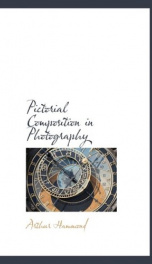pictorial composition in photography

PICTORIAL COMPOSITION PICTORIAL COMPOSITION 5 IN PHOTOGRAPHY BY ARTHUR HAMMOND, F. R. P. S. ASSOCIATE EDITOR OF AMERICAN PHOTOGRAPHY Fourth edition 1946 AMERICAN PHOTOGRAPHIC PUBLISHING CO. BOSTON PREFACE TO THE THIRD EDITION THE tremendous increase in enthusiasm for amateur photogra phy in the last few years is due very largely to the great popu larity of the miniature camera. Most of the emphasis, however, has been laid on technical and scientific achievement rather than pictorial, which seems to have been lost in the shuffle. The increased speed and greater color sensitiveness of the present day films have created a widespread interest in doing pho tographic stunts, and the tendency today is to seek subjects that are startling, bizarre and often crude. Like some of the modern music, present-day photography is loud and blatant, and attracts attention to itself by its complete rejection of all the niceties of good taste, refinement and restraint that marked the earlier periods of pictorial photography. Instead of truthful tones and subtle values, we have exaggerations and distortions which are sometimes rather unpleasant. We see black skies with lumps of white, representing clouds, that overpower a summer landscape and dark and solid shadows that indicate gross underexposure, which is hardly excusable in view of the far greater speed of modern films compared with the old standard films. The distance often is not distant, which is the result of a lack of understanding of the proper use of panchromatic materials and filters. The increased possibilities resulting from better materials and methods have been misunderstood and often misused by the eager enthusiast who has been so beguiled by the eloquence of the manu facturer and salesman that he has wandered off on the wrong track and, in reaching for perfection, has often been led to use methods and materials that make it more difficult to secure the result he wants. Grain is apt to occur when ultrarapid panchromatic films vii viii Preface to the Third Edition are used for subjects that do not really call for extreme speed and complete color correction, and in trying to eliminate grain, some of die qualities in the negative are also eliminated which are needed in order to make it suitable for yielding pictorial results. In an effort to secure correct color reproduction, atmospheric effect and the suggestion of separation of planes are often lost. In many cases this is merely the result of a lack of appreciation of just what are the important attributes of a picture and a lack of understanding as to how they may be attained so, in revising this third edition of Pictorial Composition in Photography, I have endeavored to explain to the enquiring novice how he can best take advantage of the undoubted improvements in the equip ment and materials of today and how he can use them to improve his pictures. It often happens that materials and methods that are of in estimable value to the scientific or commercial photographer are not so well adapted for pictorial photography, and the artist is master of his medium only when he understands it thoroughly and completely. When Major Stevens wanted to photograph a mountain range more than three hundred miles away, he was able to do so by tak ing full advantage of the available possibilities for penetrating at mospheric haze, but when an artist wants to show in his picture a delicately hazy and atmospheric distance, he does not adopt the same methods that Major Stevens found to be so efficient for his purpose. Such things as tliis are not always clearly understood by the beginner in pictorial photography and it is such things as this that I have endeavored to explain, not with any idea of belittling recent achievements, but rather of assigning to them their true value. Out of the two million or more people in America who use cameras it is estimated that only a few thousand or so are interested in making pictures for exhibition... --This text refers to an alternate Paperback edition.
Info about the book
Author:
Series:
Unknown
ISBN:
0520207491
Rating:
4/5 (2)Your rating:
0/5
Languge:
English
Users who have this book
Users who want this book
What readers are saying
What do you think? Write your own comment on this book!
write a commentif you like pictorial composition in photography try:
Other books by this author
Do you want to read a book that interests you? It’s EASY!
Create an account and send a request for reading to other users on the Webpage of the book!


